
Calculating odds is a science, and statisticians/analysts, who can do the job competently, receive good annual salaries (GBP 50k-80k; €60k-95k: Quantitative Analyst).
These jobs are paid so well because the results form the backbone of each bookmaker’s business. The better an analyst understands his job, the bigger the potential profit margins for the bookmaker. In order to make long-term profits, a good understanding of odds calculation is therefore also essential for any bettor.
Probability of Football Match Results
Odds are based on the probability that a certain event occurs: for example a home win, a draw, or an away win in football games based on historical data. But what is the current probability of each of these outcomes and how are percentages computed? Also, from where does one get the data from?
The following diagram shows the distribution of results for the English Premier League for home win, draw, and away win during the last five complete seasons:
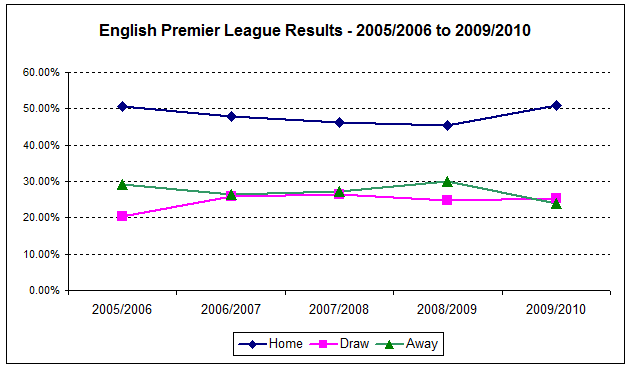
Looking at the graph, one can see that the distribution of results is rather similar for each year.
Without considering factors such as matches between strong or weak teams, teams under new management, rain affected games or anything else one can think of, fixtures in the English Premier League, according to the statistics, show on average 24.46% of all games were drawn, 27.35% ended in an away win and 48.16% were won by the home team:

Only twice (of 15) did results fall outside of ± 2% residual from the average figures, being drawn games in 2005/2006 (-4.2%) and away wins in 2009/2010 (-3.4%):

Comparison of the expected results with observations
Now, it is time to compare the expected results (based on the average results of 5 years) with the observed results of the current 2010/2011 season up to 19 February 2011:

There are quite large differences from the expected values (averages or means) to the observed results (actual results for 2010/2011) in both the drawn matches and away wins categories. However, I am pretty sure that by the end of the season, the figures will adjust themselves more in line with the 5-year average figures and that the differences showing now can be explained by having compared only two-thirds of the current season with the average results of a full-year. However, this indicates that there is an uneven distribution of home wins, draws and away wins at different times over the season, which should balance out by the close.
So, if the odds of a single match are calculated, this seasonal effect must be considered, but for this article and for your general understanding, I shall not complicate matters by touching on it further.
Mean (average value), Errors and Residuals (relative and absolute deviation)
For those of you with difficulties understanding what arithmetic mean and errors/ residuals are, herewith a few additional explanations with examples:
- Arithmetic Mean
The arithmetic mean, often referred to as simply the mean or average when the context is clear, is a method to derive the central tendency of a sample. In probability theory, the mean is also called expected value (or expectation, or mathematical expectation, or the first moment).
The mean (average value) is a known value and can therefore be used as an expectancy value.
Simply speaking, one can use the mean to predict future events (e.g. the distribution of football results) quite accurately.
Example using the 5-Year English Premier League table above for home games:
(50.53% + 47.89% + 46.32% + 45.29% +50.79%) divided by 5 = 48.16% (= mean/ average)
Therefore, it “is expected” that the 2010/2011 season will produce 48.16% home wins. - Errors and Residuals (relative and absolute deviation)
Statistical errors and residuals are two closely related and easily confused measures of the deviation.
The error of a sample (e.g. observed football results for a certain period of time) is the ‘relative’ deviation from the function value (mean), while the residual is the difference (absolute deviation) between the sample and the function value (mean).For example, the RESIDUAL (absolute deviation) for home wins during 2005/2006:
50.53% (2005/2006 home wins) minus 48.16% (average value for 5-years) = 2.37% (= residual)For example, the ERROR (relative deviation) for home wins during 2005/2006:
2.37% (residual) divided by 48.16% (mean) = 4.92% (= error)The error (relative deviation) is the proportional deviation between the observed value (the actual results) and the expectancy value (the mean/ average of all years). The error (relative deviation) puts residuals into relation to each other.

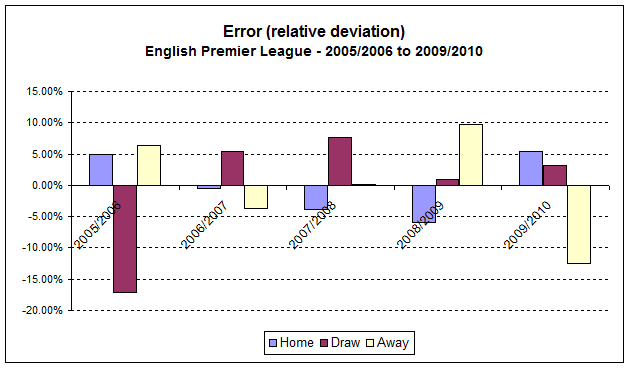
The selection of tips, which I published on 12.2.and 19.2.2011 (with a success ratio of over 32% profit both times), was based on observations of deviations, i.e. on “errors”, which are completely natural in a row of expected events.
The odds makers cannot always fully consider deviations, and therefore, on a long-term basis, there are profitable picks available. By researching and analyzing the statistical trends and then looking more directly at the individual games, it is possible to see deviations from the normal distribution, and from there, obvious “errors” in the odds.
This series of articles is concerned with the approach for selecting plays and identifying “errors” in market odds. Also, I publish weekly picks, which are made on basis of this analysis, and expose these errors to a practical test.
Calculation of Odds
Odds available in the market are based on the statistical expectation of an event, in other words, the ‘average’ value of historical football match results (= known value).
For simplification and explanation, I am now assuming that odds are calculated arithmetically through the season without considering factors such as the strength of the teams involved and any other aspect of the individual match. Certainly this is not how the odds makers calculate their odds. Genuine mathematicians among my readers may shake their heads now, but in the following example I am surmising that the odds for each match are alike during the entire season.
Then the odds would look as follows:

The formula for the computation of odds is as follows:
Home win: 48.16% probability results in a price of 2.08 (1 divided by 48.16%)
The minimum odds are computed as follows:
Home win: 2.08 calculated odds multiplied by (1 minus ‘error’ 4.14%) = 1.99
The maximum odds are computed as follows:
Home win: 2.08 calculated odds multiplied by (1 plus ‘error’ 4.14%) = 2.17
Translated into practical application for the bettor either one picks matches where the home team can be laid (not to win) at a price under 1.99 and/or matches where the home team can be backed to win at odds higher than 2.17, in order to make profit every season.
Calculation Example English Premier League
As already stated, my example assumes the odds for each match are alike during the entire season, which is obviously wrong. One only needs to consider matches for a single weekend to realize that each game has different odds for the various possible outcomes. Nevertheless, for the general understanding of odds mathematics, I shall retain this obvious implausibility.
The English Premier League has 380 matches during a season. If one has a statistically based system, then one must naturally bet on all matches as it is unknown which games will end in a home win, draw or away win.
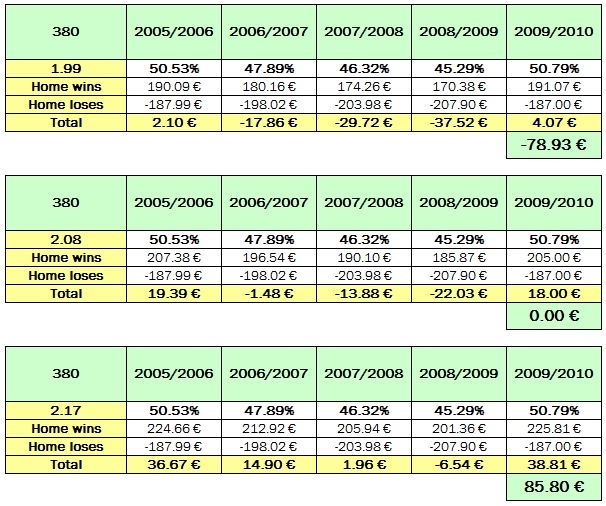
If one lays all the home teams at the minimum odds (1.99), a profit of 78.93 € is made, and only in the years 2005/2006 and 2009/2010 is a loss made.
If a lay bet or back bet is put on every home team showing odds equal to the calculated average of 2.08, the result is exactly break-even with exactly 0.00 € profit/loss.
If one backs every home team with 1.00 € showing the 2.17 maximum odds, a profit of 85.80 € is made, apart from in 2008/2009 where a slight loss would be realized.
Derived rule: One cannot obtain profits on a long-term basis if one only ‘lays’ or ‘backs’ to the average odds (i.e. the statistically expected result). One ‘lays’ if the odds are lower than statistically expected and ‘backs’ if the odds are higher than the average odds.
Apologies for such a large quantity of maths and statistics, but I hope very much that this article helps your understanding of bet mathematics.
In my next articles I will penetrate more deeply into this subject and will describe how to find market deviations, what conclusions can be drawn from them, and how matches are selected for betting purposes.
In order to be able to follow my articles and explanations however, one must perfectly understand the terms average value, errors and residuals (relative and absolute deviation) and the formula for odds computation.
Therefore, I implore you all to do your homework and check everything using your own examples and your own preferred football leagues.
If you found this article useful and would like to purchase an instructive and comprehensive book then check out our Fundamentals of Sports Betting Course: Betting on Over / Under ‘X’ Goals



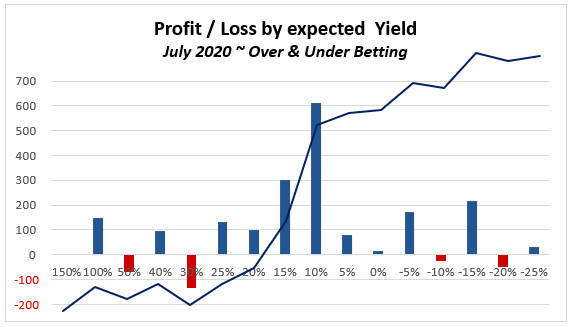
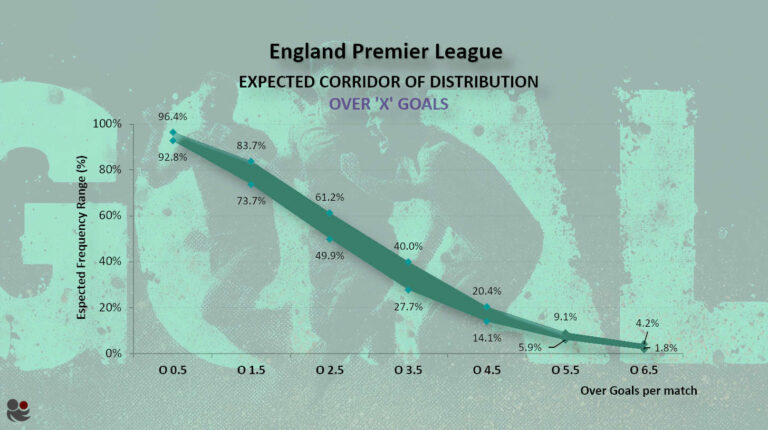



Hello, just to ask, how do you think chaos theory would affect the results of a soccer match? Like for example, in terms of 1) movements of the ball and 2) behavioural aspects. Thank you!
Chaos theory is very, very advanced maths, and goes far beyond the simplified explanations in this blog which are aimed at readers with more basic maths skills.
However, to answer your question: Yes, of course. If you are familiar with chaos theory and advanced statistics, then apply them to your calculations and predictions of match results! This will certainly lead to quite accurate results.
Try also search engines for the keywords chaos theory football. This will bring up a good number of academic articles on this subject.
How come you don’t include missing/injured players in the calculations?
Missing/insured player have a far less effect (if at all) on the final distribution of results than commonly believed. Football is a team sport. In professional football there are lots of players employed. All of them professionals. Bookmakers set their odds weeks, sometimes months, in advance. This should tell you something about the importance of injuries/ missing players for odds calculation.
In the “normal world” it’s only very tiny and poor companies with very few employees which suffer if a major employee is missing. In larger companies a sick note from an individual will hardly affect the overall performance of a company’s results.
Thank you for your help, those articles are very good and they have helped me clarify certain aspects. But with everything, the more you more learn the more questions you have 🙂 If you don’t mind could you give me your opinion on the following question?
Let’s say that I like to bet on certain events that have a high probability of happening (low odds), then I would have to:
– Find something to bet on that is statistically a sure thing. In other words a high probability and a small relative deviation over time (for instance backing Team A at home).
– Find an edge and only bet on over value home games by checking head-2-head statistics.
– Create a staking plan.
If we were to compare this strategy to one where we bet sistematicaly on every Team A home game, could we say that one is more reliable than the other, or more profitable in the long run, or is it just a personal preference?
Thank you for your time.
Without having calculations and numbers in front of me I cannot say which strategy is more reliable. Each strategy needs to be individually evaluated in detail before a statement can be made.
However, what I can say is that in the end it really doesn’t matter. You pick any strategy according to your personal preferences, and get your teeth into it. I promise that you will be able to make it a successful strategy if you don’t give up too early, and calculate and think everything through. Though it may take a long while.
One of the main mistakes unsuccessful bettors do is that they keep “shopping round”, trying one strategy for some time, then the next, and then again another. Your own time resources are one of the largest issues. Therefore it’s crucial to spezialise in order to succeed.
Hi Soccerwidow,
Glad to see the website is up and running again. I would like to ask you a question regarding the non arithmetical calculation of odds in the “Calculation of Odds” section.
In your example you, the calculated odds are found by using the 5-year mean of 48,16% (home wins). You therefore assume that for every game the odds to back the home team are of 2,08. You then use the found relative deviation the calculate the minimum and maximum odds.
If we were to calculate the odds based on reality, we would have to find the probability of the home team winnning, instead of using the 5-year average mean of 48,16%. Once we find the real odds we could then calculate the maximum and minimum odds (using the 5-year relative deviation), to which we would compare the market odds given to us.
Is this train of thought correct?
Hi Helder,
This article was just an intellectual game with deviation and probabilities. It was one of my first articles as I started to understand odds calculation.
Of course, you are thinking in the right direction, in practical terms using the mean for the calculation of odds doesn’t mean much. You need to look at each team individually.
Have you read these articles? They take the thinking a little further.
https://www.soccerwidow.com/betting-maths/case-studies/impact-overround-accumulators-multiple-bets/
https://www.soccerwidow.com/betting-maths/goal-distribution/
Thank you, Rick. We try our best!
Thanks for a well written an easy to follow article – something thats pretty rare on the subject of calculating football odds.
Ian, thank you for your very kind words 🙂
just corrected username and email……..lmfao
just found your blog……I am not usually prone to participating on forums or blogs, but I have been fascinated, reading your articles, and thought your efforts deserve to be acknowleged.
the stuff you publish kicks ass. thanks!